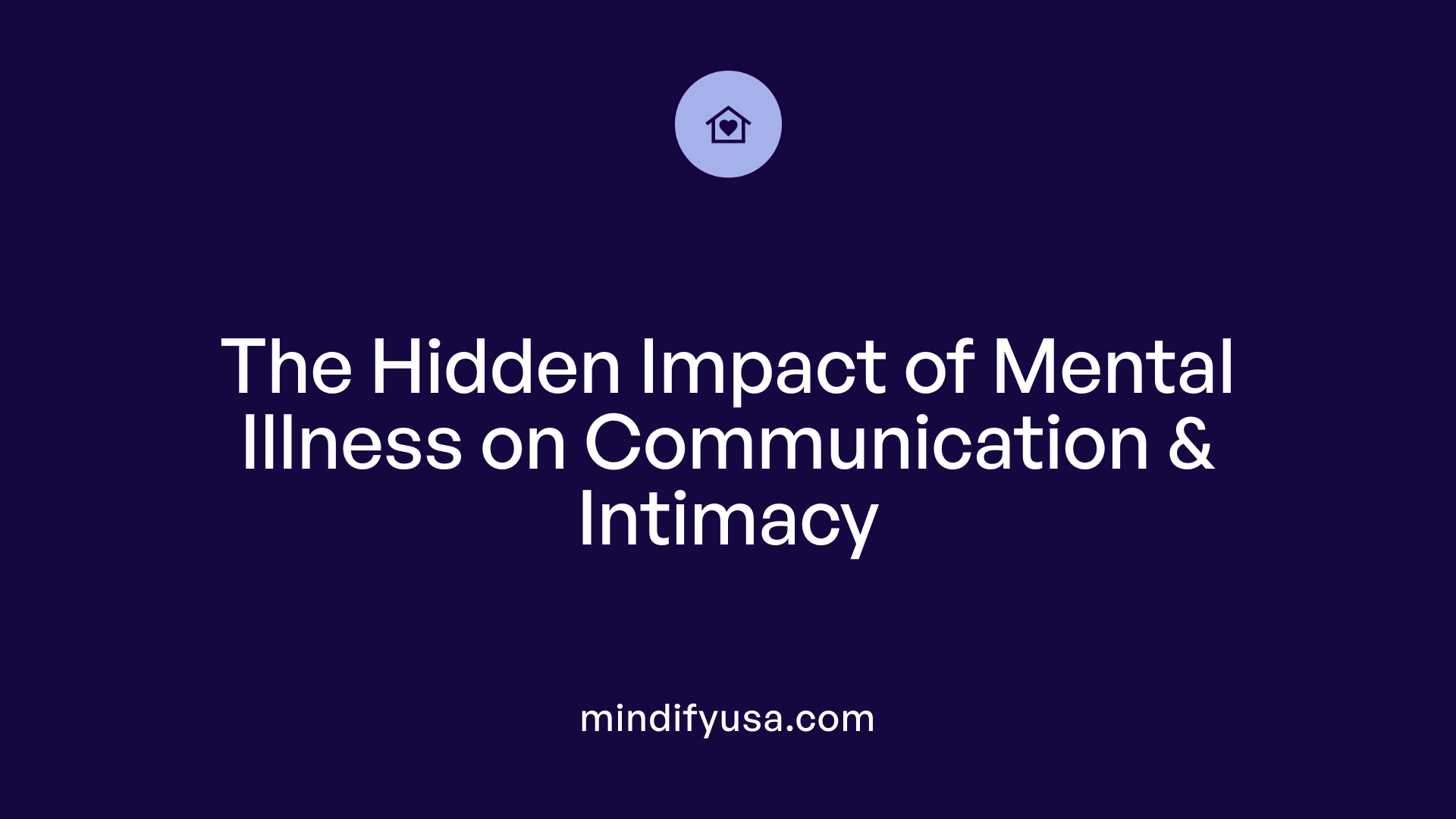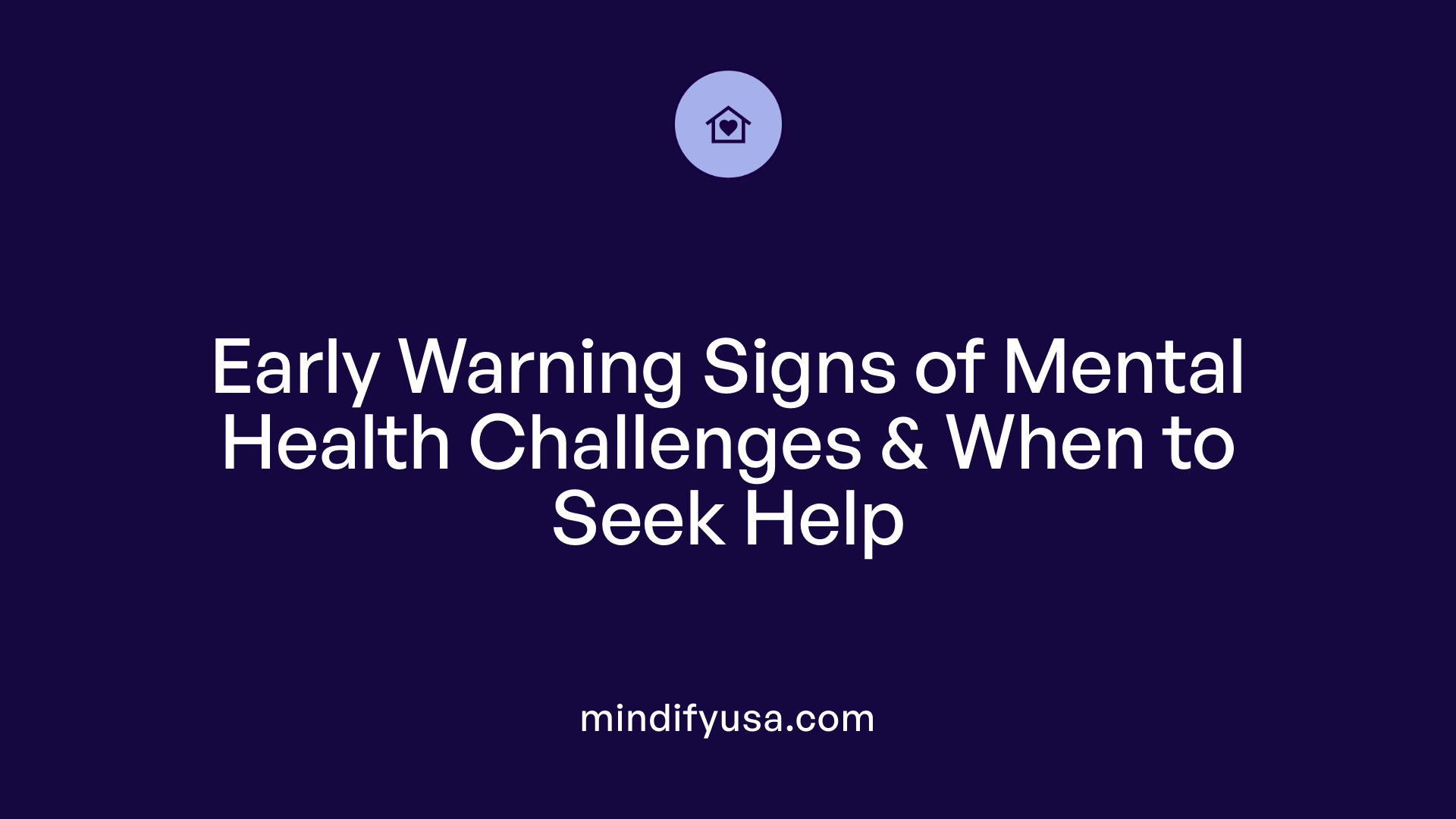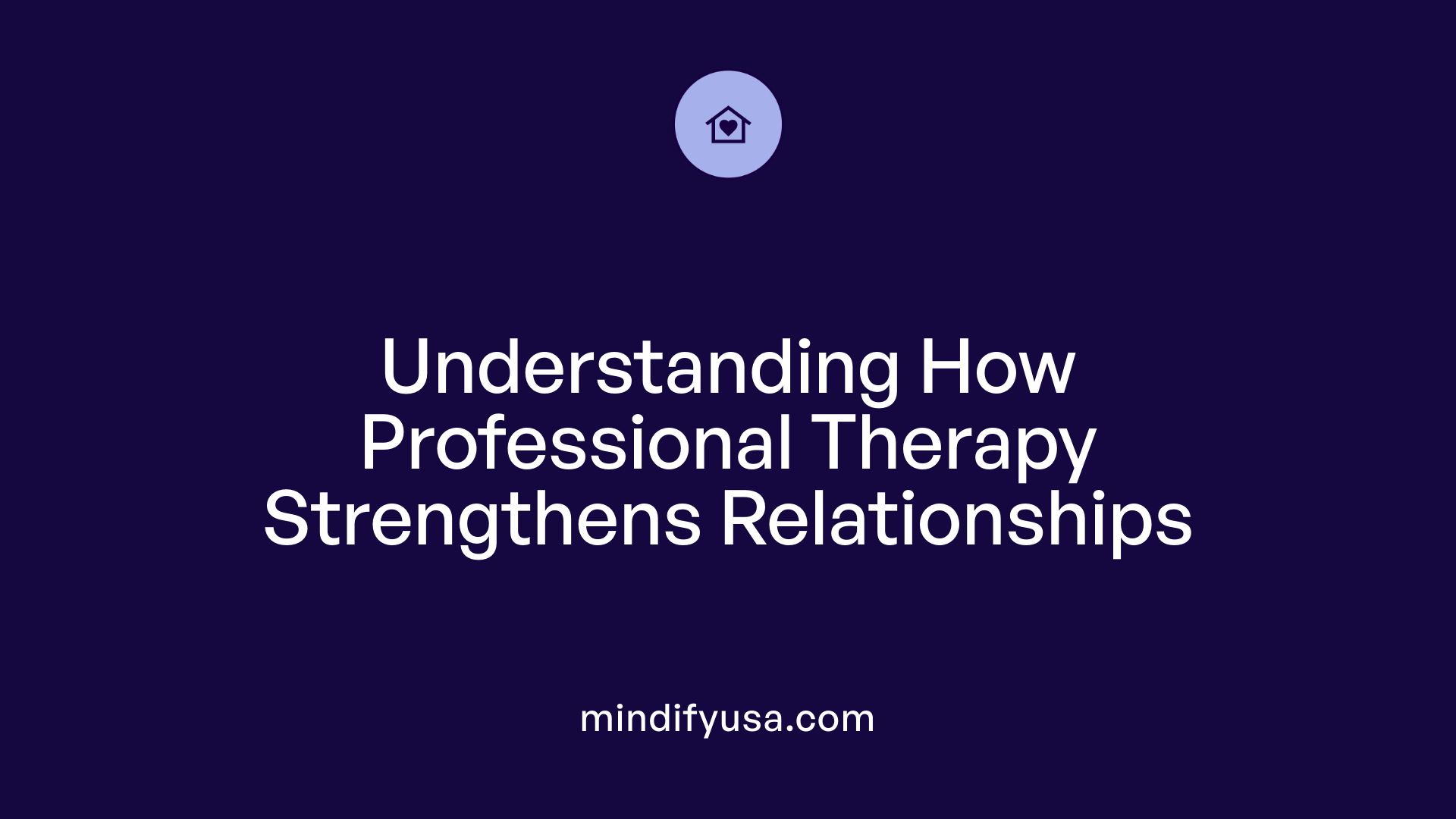Understanding the Impact of Mental Illness on Relationships
Mental illness, including conditions like anxiety and depression, can strain intimate relationships in profound ways. From communication breakdowns to shifts in emotional connection and social roles, the challenges couples face can feel overwhelming. However, with comprehensive mental health services, empathic communication, and structured support, couples can navigate these difficulties, fostering resilience and deepening their bonds rather than allowing mental health struggles to drive them apart.
Comprehensive Mental Health Services for Anxiety and Depression

What are the comprehensive mental health services available for treating anxiety and depression?
Managing anxiety and depression effectively requires a multifaceted approach that combines various treatment strategies tailored to the individual's needs.
Psychotherapy plays a central role, with cognitive-behavioral therapy (CBT) being particularly effective. CBT helps individuals identify and change negative thought patterns and behaviors that contribute to anxiety and depression, improving emotional regulation and coping skills.
Medication management is often integrated into treatment plans. Antidepressants and other psychiatric medications help reduce symptoms by stabilizing mood, decreasing emotional reactivity, and improving focus. Psychiatrists oversee medication adjustments and monitor effectiveness and side effects.
Lifestyle modifications complement clinical treatments. Regular exercise, sufficient sleep, and balanced nutrition support brain health and emotional well-being. Stress reduction techniques such as mindfulness and relaxation exercises also play a crucial role.
Support groups and psychoeducation empower patients and their partners by enhancing their understanding of these disorders. Education about symptoms, treatment expectations, and coping strategies encourages adherence to therapy and fosters empathy within relationships.
Importantly, treatment integrates medical, psychological, social, and lifestyle interventions. This comprehensive model ensures that underlying neurobiological issues and interpersonal dynamics are addressed, promoting emotional availability, communication, and relationship satisfaction.
These services can be accessed via in-person or telehealth platforms, often supported by insurance coverage. Early professional intervention, regular follow-up, and the involvement of both patients and their loved ones enhance the success of treatment and improve relationship outcomes.
| Treatment Component | Description | Role in Treatment |
|---|---|---|
| Cognitive-Behavioral Therapy (CBT) | Structured psychotherapy focusing on thought and behavior patterns | Enhances coping skills and emotional regulation |
| Medication Management | Use of antidepressants and mood stabilizers | Stabilizes mood, reduces symptoms, improves focus and emotional response |
| Lifestyle Modifications | Exercise, sleep hygiene, nutrition, stress reduction | Supports overall brain and emotional health |
| Support Groups & Psychoeducation | Education and peer support | Increases understanding, reduces stigma, strengthens support networks |
| Integrated Approach | Coordination of medical, psychological, social, lifestyle interventions | Provides holistic care for lasting mental health and relationship stability |
How Mental Illness Strains Relationships: Communication, Roles, and Emotional Distance

How Does Untreated Mental Illness Impact Relationships?
Untreated mental health conditions such as anxiety, depression, bipolar disorder, and ADHD significantly strain relationships. These disorders often lead to increased conflicts, misunderstandings, and emotional distance between partners. For example, anxiety disorders like Generalized Anxiety Disorder can cause avoidance of intimacy and social withdrawal, while depression might create emotional walls and reduce participation in shared activities.
What Is the Effect on Communication and Intimacy?
Mental illness can disrupt effective communication, causing emotional reactivity, irritability, or withdrawal. This breakdown often damages intimacy—depression, in particular, is known for reducing libido and fostering resentment on both sides. As trust and closeness fade, partners may find it difficult to connect emotionally or physically.
How Does Emotional Withdrawal and Physical Distancing Manifest?
Individuals with mental illness may emotionally withdraw by reducing engagement with loved ones and physically distancing themselves. Social isolation increases, further impairing mutual understanding and empathy within the relationship.
In What Ways Does Role Redistribution and Financial Strain Occur?
Mental illness often leads to redistribution of household and financial responsibilities. The partner without the illness may assume more chores, financial management, and social obligations, sometimes requiring protective measures such as separate bank accounts or employment planning to manage instability.
What Are the Consequences for Partner Responsibilities and Burnout?
The increased burden can cause the caregiving partner to feel burnout, frustration, guilt, or insecurity. This emotional upheaval places additional strain on the relationship, emphasizing the importance of support systems and professional help for both partners.
| Aspect | Description | Impact on Relationship |
|---|---|---|
| Untreated Mental Illness | Conditions like anxiety, depression, bipolar disorder, ADHD | Leads to conflicts, misunderstandings, emotional distancing |
| Communication & Intimacy | Disrupted by irritability, withdrawal, reduced libido | Damages trust and closeness |
| Emotional & Physical Withdrawal | Avoidance of intimacy and social engagement | Increases isolation and lessens empathy |
| Role Redistribution & Finances | Partner without illness takes on more responsibilities | Causes stress, need for financial safeguards |
| Partner Burnout | Emotional strain from caregiving duties | Frustration, guilt, relationship dissatisfaction |
Integrated Psychiatric and Relationship-Focused Care: A Collaborative Approach
Combining Psychiatric Treatment with Couples or Family Therapy
Addressing mental health conditions such as anxiety, depression, ADHD, and bipolar disorder within the context of a relationship requires an integrated treatment approach. Psychiatric care combined with couples or family therapy allows for simultaneous attention to neurobiological factors and interpersonal dynamics. This collaborative strategy supports both the individual's mental health needs and the relationship’s well-being.
Advanced Diagnostic Assessments and Treatment Options
Modern psychiatric care utilizes thorough diagnostic evaluations to identify underlying mental health conditions affecting relationships. Treatment options are diverse and include medication management to stabilize mood and emotional reactions, as well as advanced neuromodulation therapies like Transcranial Magnetic Stimulation (TMS), offering alternatives for those with treatment-resistant symptoms.
Medication Management and Neuromodulation Therapies
Psychiatric medications reduce emotional reactivity, mood swings, irritability, and improve focus, contributing positively to relationship health. Neuromodulation therapies provide targeted treatment to areas of the brain involved in mood and attention regulation, which can be crucial when traditional medications are insufficient. Close monitoring by psychiatrists ensures optimal medication adjustments and therapy effectiveness.
Role of Psychiatrists and Therapists Working Together
Psychiatrists conduct comprehensive evaluations, oversee medication management, and employ advanced treatments, while therapists focus on developing communication skills, empathy, and conflict resolution strategies among couples. This interdisciplinary collaboration supports a holistic recovery, with mental health professionals working jointly to address both individual symptoms and relational challenges.
Benefits of Integrated Care on Emotional Regulation and Empathy
Couples receiving combined psychiatric and relationship-focused care typically experience enhanced emotional availability and empathy. Improved emotional regulation leads to reduced conflicts and misunderstandings, fostering healthier communication and stronger connections. This approach ultimately promotes resilience and long-term relationship satisfaction.
Supporting Partners: Strategies for Engagement, Boundaries, and Self-Care

How Can Partners Support Loved Ones Undergoing Treatment?
Supporting a partner with mental illness involves encouragement, positive reinforcement, and realistic goal-setting during treatment. Participating in couple- or family-based therapies can engage partners directly in the healing process, fostering mutual understanding and collaboration. Partners should learn about the disorder to better understand symptoms and treatment strategies, which helps create a supportive environment.
Why Are Open Communication and Setting Boundaries Important?
Open communication between partners builds trust and reduces misunderstandings related to mental illness. Setting clear boundaries helps maintain emotional health and keeps interactions respectful, preventing additional stress. Establishing these limits also allows both partners space to manage their responsibilities without resentment or burnout.
What Self-Care Practices Help Prevent Burnout?
Practicing self-care is essential for partners supporting someone with mental illness. This includes maintaining social support systems and engaging in activities that promote physical and mental well-being, such as exercise, hobbies, and rest. Prioritizing one’s own health prevents caregiver fatigue and sustains the ability to provide ongoing support.
When Should Partners Seek Support Networks and Professional Help?
Partners should seek external support from friends, family, or mental health professionals to share their experiences and alleviate stress. Professional counseling or support groups provide valuable resources and coping strategies. It is crucial that partners also access help tailored to their emotional needs, ensuring they are not isolated in their caregiving role.
How Can Using Reliable Information Sources Enhance Support?
Accessing credible sources like the National Institute of Mental Health (NIMH) offers accurate, up-to-date information about mental illnesses. This knowledge empowers partners to better understand symptoms, treatment options, and effective support techniques, improving both the patient’s and their own mental health outcomes.
Enhancing Relationship Stability During Mental Health Challenges
What role do psychoeducation, couple counseling, and sex therapy play?
Psychoeducation helps couples understand mental health issues, reducing stigma and fostering empathy. Couple counseling offers a safe and impartial space to address communication difficulties and emotional strain caused by mental illness. Sex therapy can address intimacy challenges, including reduced libido and physical distance that often arise during disorders like depression.
Why are empathy and regular communication important?
Empathy allows partners to appreciate each other’s struggles authentically, reducing feelings of blame and isolation. Regular communication helps partners check in on emotional needs, share challenges, and reinforce connection, which strengthens their bond despite mental health stresses.
How can couples manage resentment, blame, and emotional upheaval?
Resentment and blame can erode relationships if left unaddressed. Practicing understanding and recognizing the impact of illness rather than personal shortcomings mitigates negative emotions. Strategies like setting boundaries and involving professionals help contain emotional upheaval and foster healthier interactions.
Why is patience and mutual admiration encouraged?
Mental illness treatments often require time and adjustments; patience supports sustained healing and relationship growth. Mutual admiration maintains positive regard, reminding partners of each other’s value beyond illness, which nurtures resilience.
What are the benefits of ongoing support and relationship education?
Continuous support, whether through therapy or peer groups, equips couples with tools to cope proactively. Relationship education, including communication and conflict resolution skills, empowers couples to navigate challenges, enhancing overall satisfaction.
Together, these approaches form a comprehensive strategy to maintain and even strengthen relationships amidst mental health difficulties, promoting long-term stability and emotional connection.
Recognizing Early Warning Signs and Promptly Seeking Help

What Are the Early Warning Signs?
Recognizing persistent emotional dysregulation, mood disturbances, and changes in sleep patterns is essential in identifying mental health issues that may affect relationships. Signs such as ongoing irritability, frequent mood swings, difficulty concentrating, or disrupted sleep should not be overlooked.
Why Is Early Psychiatric Evaluation Important?
Early psychiatric evaluation allows for timely diagnosis and tailored treatment plans. Addressing these symptoms promptly can prevent escalation of mental health conditions like anxiety, depression, ADHD, or bipolar disorder, reducing the strain on relationship dynamics.
How Does Early Intervention Improve Relationships?
Intervening early helps restore emotional balance and enhances communication between partners. This leads to improved empathy, conflict resolution, and emotional availability, all of which contribute to stronger, more satisfying partnerships.
Accessing Psychiatric Services and Insurance Coverage
Many insurance plans cover psychiatric assessments, medication management, and advanced treatments such as neuromodulation therapies (e.g., Transcranial Magnetic Stimulation). Both in-person visits and telehealth options are available, increasing convenient access to professional care.
Crisis Intervention Options
Should symptoms deteriorate rapidly, crisis intervention services offer immediate support to individuals and couples struggling with acute mental health episodes. These services ensure safety and facilitate rapid connection to ongoing treatment resources.
Early recognition and prompt, comprehensive psychiatric care not only support individual wellness but also foster healthier and more resilient relationships.
The Role of Professional Mental Health Services in Managing Relationship Strain

How do individual, couples, and family therapy benefit relationships affected by mental illness?
Professional mental health services offer various therapy forms tailored to relationship dynamics and individual needs. Individual therapy helps individuals manage symptoms like depression, anxiety, or bipolar disorder, improving emotional regulation and communication skills. Couples therapy provides a safe, impartial setting to address misunderstandings, emotional distance, and conflict caused by mental health challenges, fostering empathy and mutual support. Family therapy can support relational systems, especially when children or other family members are affected, promoting healthier family communication and understanding.
How do medication and advanced treatments contribute to symptom control?
Modern psychiatric treatments extend beyond therapy to include medication management and advanced interventions like Transcranial Magnetic Stimulation (TMS). Medications can stabilize mood, reduce emotional reactivity, improve focus, and decrease irritability—symptoms that often strain relationships. Neuromodulation therapies such as TMS target neurobiological factors of disorders like depression, augmenting benefits from therapy, and helping restore emotional availability within partnerships.
How can professional services address social isolation and improve conflict resolution?
Untreated mental disorders often lead to social withdrawal and increased arguments within relationships. Mental health professionals use psychoeducation to inform couples about illness effects, reducing blame and resentment. Therapies focus on developing communication skills, conflict resolution techniques, and empathy, thus helping reduce interpersonal distance and promote healthier interactions.
What support is available for children and family members affected by mental illness?
Mental illness in one partner can impact the entire family, including children who may experience emotional challenges. Mental health services often incorporate support groups or therapy specifically for children to mitigate emotional impacts. Family therapy also addresses role shifts and financial challenges within households, helping all members adapt and thrive.
How is a balanced approach to treatment and relationship support created?
An integrated approach combines psychiatric care—including evaluations, medication, and advanced treatment modalities—with relationship-focused therapies. This holistic model attends to both neurobiological and interpersonal factors, promoting improved mental health alongside relationship stability. Encouraging open communication, self-care for all parties, and ongoing support services form the foundation for sustaining stronger, more resilient relationships amid mental health challenges.
Building Resilience and Connection Amid Mental Illness
Although mental illness poses significant challenges to intimate relationships, adopting a comprehensive, compassionate, and collaborative approach can transform these difficulties into opportunities for growth and deeper connection. Early recognition, professional treatment combining psychiatric and relationship therapies, along with strong partner support and self-care, foster emotional availability, empathy, and healthier communication. With patience and perseverance, couples can strengthen their bond, navigating the complexities of mental health with resilience and mutual understanding.
References
- Psychiatry for Relationship Problems
- Spouse or Partner
- Living With Someone With Mental Illness
- Lived experiences of couples in a relationship where one ...
- Protecting Relationships from Depression
- Supporting a partner with depression
- 12 Tips For Staying In A Relationship With A Mentally Ill ...
- Anxiety disorders - Diagnosis and treatment





































































































